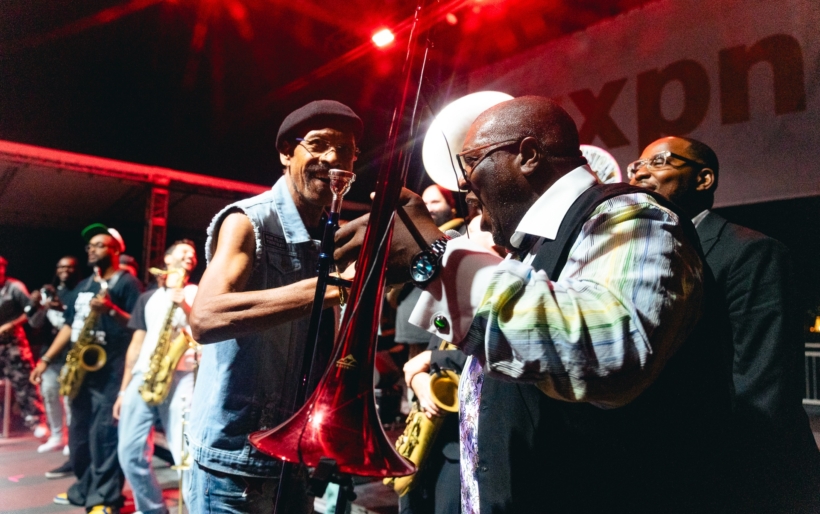Good Vibes and High Energy: WAR at XPNFest
WAR is the rare band whose music is cosmopolitan yet grounded, stylistically broad yet distinct.

WAR | photo by Danielle Ciampaglia for WXPN
For the last half century, veteran funk band WAR has brought the sound and culture of Los Angeles to the world. Last night’s XPoNential Music Festival set was a perfect showcase of the band’s fun, sonically diverse catalog. Currently in the midst of tour for the 50th Anniversary of their seminal album Why Can’t We Be Friends?, WAR closed the opening night of XPoNential with good vibes and high energy.
The band came out swinging with a hard-swinging version of “Baby Brother” from their 1971 classic All Day Music. In between the song’s main groove and Latin breakdowns, keyboardist / singer Lonnie Jordan lit the crowd up with some Sly Stone-style, churchified organ runs. Jordan — a founding member of War — led the band with charisma, belting out songs and disarming the crowd with quips and sly jokes. After “Baby Brother” broke down into a brief but thunderous drum solo from Sal Rodriguez, Jordan broke into a monologue, backing himself on organ. From there, the band launched into the slick, understated groove of “Slipping Into Darkness.” During another organ break, Jordan chided the crowd: “I smell weed, and it smells good. I’m getting high…contact high.” Between the song’s slinky rhythm parts and James Baker’s razor-sharp guitar solo, it’s surprising how strong and progressive the song still sounds nearly 50 years after it was composed.

“The Cisco Kid” was as bright and bouncy as it sounded when it was first laid down on wax back in the early ’70s. For “The Cisco Kid” and for most of the evening, sax player Scott Martin and harmonica player Mitch Kashmar acted as a de facto horn section, doubling each other’s lines skillfully.
“Spill The Wine,” the 1970 hit the band scored with Eric Burdon of The Animals, was a predictable crowd-pleaser with its lovely flute solo, trippy monologue, and Lonnie Jordan’s disarming humor. The band pushed the tempo back up with “Galaxy,” a futuristic disco-funk cut. Lonnie Jordan and bassist Rene Camacho shone brightly on “Galaxy.” Jordan stretched the song’s harmonic palette by adding some jazz piano chords on top of the groove, while Camacho took a dexterous, extended bass solo. Not to be upstaged, Martin and Kashmar engaged in a musical duel of sorts, stepping into the center of the stage, exchanging fiery solos. At first, the duo traded long 8-bar solos, then 4, then 2. As each round of solos was halved, and both musicians ran the risk of crashing into one another, the energy and drama of the moment reached a fever pitch. The rest of the band grooved tightly behind them, and Lonnie Jordan added color in the form of discordant piano chords.
Following a dreamy, lullaby-like electric piano solo — during which Jordan pretended to fall asleep as he played — Rodriguez took lead vocals for “So.” A beautiful ballad in the classic late ’60s / ’70s style, “So” is as lovelorn and bitter as it is emotionally honest and vulnerable. With its soulful keyboard chords and cooing “Oooh Ooh Oooh” vocal harmonies, “So” has a place in the great tradition of sweet-soul ballads that is an integral part of Los Angeles’ car and street culture.

“Ballero” allowed the band to put its Afro-Latin influences on full display. A dreamy, summery bop, “Ballero” is indicative of War’s identity as a whole that is greater than its parts. In addition to the song’s popping Latin groove, Baker took a gorgeous solo that included a section in which he deftly interpolated The Jimi Hendrix Experience’s psychedelic classic “Third Stone From The Sun.” At this point, the energy at Wiggins Park was high, and the audience was held comfortably in the collective palm of War’s hand.
The show culminated with Lonnie Jordan and War inviting members of SNACKTIME and Preservation Hall Jazz Band to the stage. At this point, the de facto horn section of Martin and Kashmar was augmented with the Preservation Hall horns, and all three bands were primed for a rousing performance of “Low Rider.” Played with a tight reggae swing, the song is just as catchy and indelible as ever. As the audience joined the band in a big, joyous sing-along of the chorus, the vision of War becomes clear. At their core, War is a global jam and a sincere mixture of cultures free of pretension. War is the rare band whose music is cosmopolitan yet grounded, stylistically broad yet distinct.





















